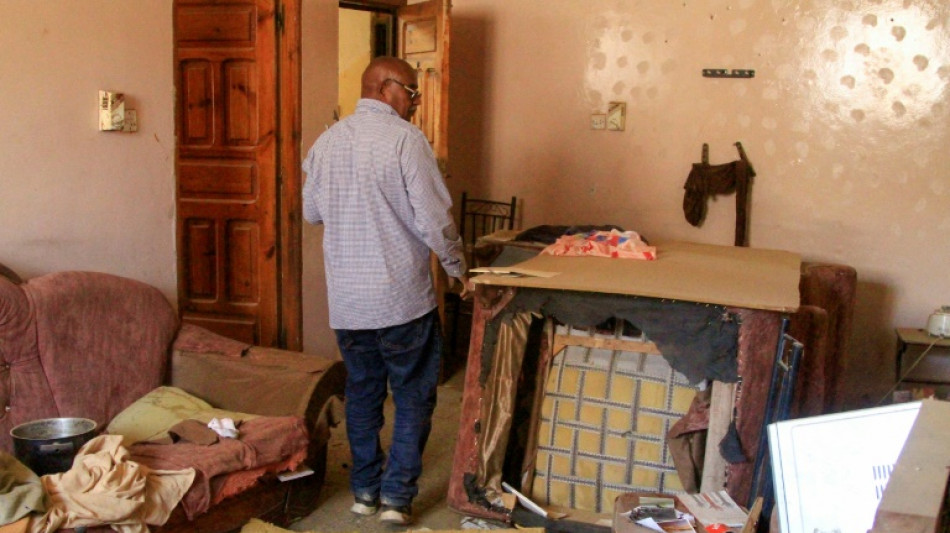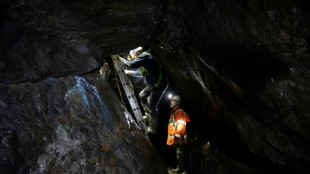
-
 British cycling icon Hoy and wife provide solace for each other's ills
British cycling icon Hoy and wife provide solace for each other's ills
-
Money, power, violence in high-stakes Philippine elections

-
 Iran, US hold second round of high-stakes nuclear talks in Rome
Iran, US hold second round of high-stakes nuclear talks in Rome
-
Japanese warships dock at Cambodia's Chinese-renovated naval base

-
 US Supreme Court pauses deportation of Venezuelans from Texas
US Supreme Court pauses deportation of Venezuelans from Texas
-
Pakistan foreign minister arrives in Kabul as Afghan deportations rise

-
 Heat and Grizzlies take final spots in the NBA playoffs
Heat and Grizzlies take final spots in the NBA playoffs
-
Iran, US to hold second round of high-stakes nuclear talks in Rome

-
 Humanoid robots stride into the future with world's first half-marathon
Humanoid robots stride into the future with world's first half-marathon
-
Migrant's expulsion puts Washington Salvadorans on edge

-
 Plan for expanded Muslim community triggers hope, fear in Texas
Plan for expanded Muslim community triggers hope, fear in Texas
-
Pakistan foreign minister due in Kabul as deportations rise

-
 White House touts Covid-19 'lab leak' theory on revamped site
White House touts Covid-19 'lab leak' theory on revamped site
-
Dodgers star Ohtani skips trip to Texas to await birth of first child

-
 US senator says El Salvador staged 'margarita' photo op
US senator says El Salvador staged 'margarita' photo op
-
Ford 'adjusts' some exports to China due to tariffs

-
 Thomas maintains two-shot lead at RBC Heritage
Thomas maintains two-shot lead at RBC Heritage
-
US to withdraw some 1,000 troops from Syria

-
 Four killed after spring storms wreak havoc in the Alps
Four killed after spring storms wreak havoc in the Alps
-
Spurs' Popovich reportedly home and well after 'medical incident'

-
 Trump goes to war with the Fed
Trump goes to war with the Fed
-
Celtics chase second straight NBA title in playoff field led by Thunder, Cavs

-
 White House site blames China for Covid-19 'lab leak'
White House site blames China for Covid-19 'lab leak'
-
Norris edges Piastri as McLaren top Jeddah practice

-
 Trump warns US could ditch Ukraine talks if no progress
Trump warns US could ditch Ukraine talks if no progress
-
Judge denies Sean 'Diddy' Combs push to delay trial

-
 80 killed in deadliest US attack on Yemen, Huthis say
80 killed in deadliest US attack on Yemen, Huthis say
-
Lebanon says two killed in Israeli strikes in south

-
 Trump says US will soon 'take a pass' if no Ukraine deal
Trump says US will soon 'take a pass' if no Ukraine deal
-
F1 success is 'like cooking' - Ferrari head chef Vasseur

-
 Cycling mulls slowing bikes to make road racing safer
Cycling mulls slowing bikes to make road racing safer
-
Macron invites foreign researchers to 'choose France'

-
 Klopp 'happy' in new job despite Real Madrid rumours: agent
Klopp 'happy' in new job despite Real Madrid rumours: agent
-
Alcaraz into Barcelona semis as defending champion Ruud exits

-
 Vance meets Italy's Meloni before Easter at the Vatican
Vance meets Italy's Meloni before Easter at the Vatican
-
Evenepoel returns with victory in Brabantse Pijl

-
 Maresca confident he will survive Chelsea slump
Maresca confident he will survive Chelsea slump
-
Mob beats to death man from persecuted Pakistan minority

-
 Lebanon says one killed in Israeli strike near Sidon
Lebanon says one killed in Israeli strike near Sidon
-
Arsenal's Havertz could return for Champions League final

-
 US officials split on Ukraine truce prospects
US officials split on Ukraine truce prospects
-
Client brain-dead after Paris cryotherapy session goes wrong

-
 Flick demands answers from La Liga for 'joke' schedule
Flick demands answers from La Liga for 'joke' schedule
-
'Maddest game' sums up Man Utd career for Maguire

-
 Trial opens for students, journalists over Istanbul protests
Trial opens for students, journalists over Istanbul protests
-
Gaza rescuers say Israeli strikes kill 24 after Hamas rejects truce proposal

-
 'Really stuck': Ukraine's EU accession drive stumbles
'Really stuck': Ukraine's EU accession drive stumbles
-
'Not the time to discuss future', says Alonso amid Real Madrid links

-
 74 killed in deadliest US attack on Yemen, Huthis say
74 killed in deadliest US attack on Yemen, Huthis say
-
Southgate's ex-assistant Holland fired by Japan's Yokohama


'War has taken everything': AFP reporter returns home to Khartoum
It had been nearly two years since AFP journalist Abdelmoneim Abu Idris Ali set foot in his home in war-torn Khartoum, after the sound of children playing in the street gave way to the fearsome fire of machine guns.
Sudan's once-peaceful capital awoke to the sound of bombs and gunfire on April 15, 2023 as war broke out between its two most powerful generals -- army chief Abdel Fattah al-Burhan and his former deputy Mohamed Hamdan Daglo, who commands the paramilitary Rapid Support Forces (RSF).
Bombs tore through homes, fighters took over the streets and hundreds of thousands scrambled to escape -- among them Abdelmoneim, his wife, his son and three daughters.
Since then they have been displaced five times -- fleeing each time the front line closed in.
Eventually the 59-year-old journalist sent his family to safety in another African country while he settled down to work alone from Port Sudan on the Red Sea.
Then last month he was able to briefly return to his home in Khartoum North during a reporting trip escorted by the army after it recaptured the city.
He found his beloved neighbourhood, known as Bahri, abandoned.
"The whole place is cloaked in silence, no grocery store chit-chats, no boisterous games of football on the corner, nothing," he said.
- 'Like an earthquake' -
"The last time I was here, the neighbours were all in the street saying goodbye, praying for each other's safety, promising we would meet again soon."
Now their doors hung ajar, beds dragged out onto the street, apparently by RSF fighters who used them to sleep in the open air.
Since the war broke out, the paramilitaries have been notorious for taking over and looting homes, selling the contents or taking it for themselves.
When he got to his landing, Abdelmoneim braced himself for what he would find inside.
"It was like an earthquake had hit. The furniture was upside-down and thrown around, pieces shattered on the ground," he said.
He clambered slowly from room to room, taking in the damage.
The couch was pocked with burn marks where the fighters had put out cigarette after cigarette.
His daughters' closets were ripped open and emptied of every last dress.
And on the floor of his office, lying among the tattered remains of his library, was a photo of his wedding to his wife Nahla, with her image torn out.
"I don't get what they have against my books and my wedding photos," he said.
"I knew they had stolen furniture. I couldn't imagine they would destroy everything else."
- 'Wish my kids had never seen that' -
In March, the army recaptured Khartoum, to the joy of millions of displaced Sudanese anxious to return to their homes.
"But my girls say they never want to come back," Abdelmoneim said.
"How can they ever forget sleeping huddled together in the living room, terrified by the sound of every air strike?"
Abdelmoneim shudders at the thought of the horrors they have seen since.
"When we were leaving Khartoum, there were bodies lying in the street and an old man standing over them, trying to keep a plastic sheet in place.
"When I stopped to ask him if he was okay, he said, 'I'm trying to keep the dogs away.' I wish my kids had never heard that."
For seven months, Abdelmoneim tried to wait out the fighting in Wad Madani, just south of Khartoum, hoping against hope they could go home.
"The moment I realised this wouldn't end for years was when the war came to Wad Madani," he said.
Again they took everything they could carry, and again they joined a wave of hundreds of thousands of people running away, this time on foot, heading east.
The veteran journalist and his wife made the painful choice to separate the family -- she and the children would go to another country; and he would go to Port Sudan on the Red Sea, home to the United Nations, the army-aligned government and hundreds of thousands of displaced people.
- Destitution and displacement -
Abdelmoneim, like countless Sudanese caught in the war's crossfire, has lost family members, his life savings and any hope for the future.
"This war has taken everything from us," he said.
"And everything they haven't taken, they've destroyed."
For years he had been building up a tiny homestead on the outskirts of Khartoum, lined with fruit trees and a few simple crops he could tend when he retired. The RSF destroyed it in their rampage.
His family's home and land, in the agricultural state of Al-Jazira, were looted and cut off from power and water -- his relatives left starving and powerless to defend themselves against the RSF's predations.
Now both Al-Jazira and Khartoum are under army control but the war, and the suffering it has wrought, is far from over.
Tens of thousands have been killed and more than 12 million uprooted, including almost four million who fled to other countries.
Hundreds of thousands are returning to areas recaptured by the army, choosing destitution at home over displacement, but most of these areas still lack clean water, electricity and health care.
Famine still stalks Sudan, with around 638,000 people already in famine and eight million on the brink of mass starvation.
The country remains divided, and the RSF -- in control of nearly all of the western region of Darfur and, with its allies, parts of the south -- has not given up the fight.
In recent weeks, the paramilitaries have killed hundreds of people in famine-stricken displacement camps, while RSF chief Daglo has announced a rival administration to rule over the ashes.
For many like Abdelmoneim, even their modest dreams now seem impossible.
"If this war ends tomorrow, all I want is to be somewhere quiet and safe with my family, farming in peace."
T.Egger--VB



